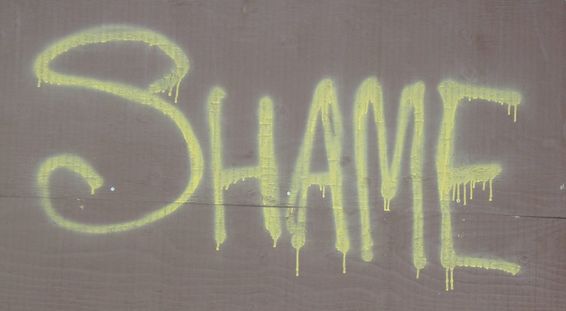Most of these shameful things are from my years as a feminist atheist, but I have to admit to a cringe-worthy episode or two since then – including the day a decade ago when I totally lost my temper over something that would have been easy to justify before I knew Jesus, but was definitely unacceptable in one who professed to follow Him.
I know the Bible instructs us repeatedly not to dwell on the past. For instance, as the prophet Isaiah quoted the Lord in chapter 18 of his book, “"Do not remember the former things, nor consider the things of old. Behold, I will do a new thing, now it shall spring forth; shall you not know it?” And in the New Testament, Jesus is quoted as saying “No one, having put his hand to the plow, and looking back, is fit for the kingdom of God.” (Luke 9:62)
Alas, I’ve been unable to leave some of these things behind, instead repenting repeatedly over them. After all, we can’t erase the impact of hurtful thoughts, words and deeds; our victims may forgive us, but they won’t forget. How could they?
But then, on a recent Saturday afternoon, I had an epiphany. It’s probably obvious to most of you, dear readers, but I’ll bet one or two of you spend more than a little time beating yourselves up for the transgressions of the past. Maybe you’ve even popped a pill or two or downed a shot or three in an effort to silence your nagging conscience.
Here’s what happened. I was in my garden slaughtering Japanese beetles and singing snatches of favorite old hymns, when a favorite of my late friend Ruth H. came up on my mental juke box: “Whiter than snow, whiter than snow, now wash me and I shall be whiter than snow.”
I stopped dead in my tracks: Whiter than snow?
I knew that the phrase came from a psalm, but couldn’t remember which one. I raced inside to look it up in my NKJV.
And there it was, nestled in the first ten verses of Psalm 51, which was written by King David after the prophet Nathan confronted him for his disastrous sin with Bathsheba:
Have mercy upon me, O God,
According to Your lovingkindness;
According to the multitude of Your tender mercies,
Blot out my transgressions.
Wash me thoroughly from my iniquity,
And cleanse me from my sin.
For I acknowledge my transgressions,
And my sin is always before me.
Against You, You only, have I sinned,
And done this evil in Your sight –
That You may be found just when You speak,
And blameless when You judge.
Behold, I was brought forth in iniquity,
And in sin my mother conceived me.
Behold, You desire truth in the inward parts,
And in the hidden part You will make me to know wisdom.
Purge me with hyssop, and I shall be clean;
Wash me, and I shall be whiter than snow.
Make me hear joy and gladness,
That the bones You have broken may rejoice.
Hide Your face from my sins,
And blot out all my iniquities.
Create in me a clean heart, O God,
And renew a steadfast spirit within me.
And there it was: a poignant reminder that Christ died not to bury, nor cover, nor white wash, the sins of the world.
He died to wash them away!
It’s a recurrent theme throughout the Bible – perhaps most notably in this oft-cited line from the apostle John’s first epistle: “If we confess our sins, He is faithful and just to forgive us our sins and to cleanse us from all unrighteousness.” (1 John 1:9)
And just think of the result. As David wrote in Psalm 103:
For as the heavens are high above the earth,
So great is His mercy toward those who fear Him;
As far as the east is from the west,
So far has He removed our transgressions from us.
As far as the east is from the west – why, wouldn’t that be infinity?
I had read these passages time and time again – apparently, without taking them to heart. But now, thanks to a precious old hymn written in the 19th century by Irish immigrant and postal clerk James L. Nicholson, I was set free at last from these relentless regrets.
“Therefore if the Son makes you free, you shall be free indeed.” (John 8:36)
Hallelujah!

 RSS Feed
RSS Feed